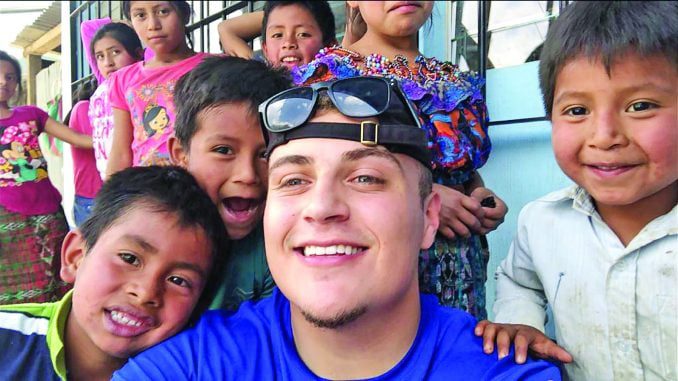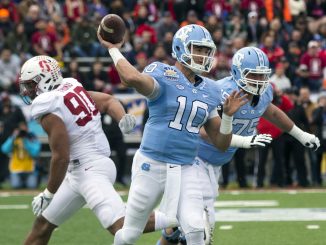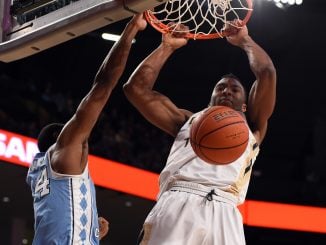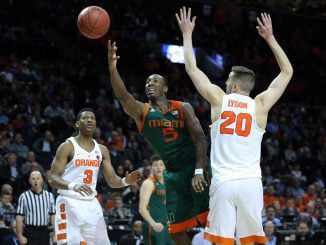
Summer break is usually a time for college athletes to rest, recharge their batteries and begin preparing for the next season in the weight room.
For 13 members of the Duke football team, however, it was a chance to change the world for the better.
The Blue Devil contingent spent the week between Duke’s spring semester and first summer session in Guatemala, doing work for Habitat for Humanity.
“This was not a tourist trip,” said Gabe Brandner, Duke’s starting left tackle for the last three years. “It was very much a service trip.”
Brandner and backup quarterback Parker Boehme, both recent graduates, were joined by nine current Duke players — long snapper Ben Wyatt, linebacker Brandon Hill, running back Elijah Deveaux, linebacker Koby Quansah, quarterback Daniel Karlin, cornerback Antone Williams, tight end Daniel Helm, defensive tackle Scott Jones and linebacker Kevin Gehsmann.
“We also had (coordinator of player personnel) Will Cole, who manages our recruiting, our team pastor Mitch (James Mitchell) and Dean Sue (Wasiolek), our dean of students,” Brandner said.
The team has worked with Durham Habitat for Humanity on several short-term projects during the school year, and that organization helped them find an assignment in Guatemala.
“The big selling point was allowing us to have the experience and opportunity to go to another country and go through this as a team,” said Wyatt, whose family has a charity organization that does similar work in Costa Rica. “The camaraderie built over the week was unbelievable.”
The Blue Devils stayed in hostels in Antigua and worked in the village of El Rejon on a pair of projects.
“We had three different groups that rotated,” said Wyatt. “One group would go help with a house.”
The team members helped to build the foundation for a Habitat house, working with experienced masons from the area.
“The work ethic of the people we were with was amazing,” said Brandner. “They were 70-, 80-year-old men doing very intense labor. When they don’t have groups helping out, that’s their job. They get paid per house. And they were showing up these 20-year-old football players.”
Still, the size and strength of the football team certainly came in handy.
“We were able to get a lot of work done in that time,” Wyatt said. “Being able to have the physical aspect, coming from the football team. We were a lot of hard workers.”
“They told us we saved the masons two weeks of work,” Brandner added.
The other two groups built stoves for existing homes in the village.
“Habitat told us that 70 percent of Guatemala lives in poverty,” Brandner said. “And of that 70 percent, 30 percent lives in extreme poverty, which is earning one to two dollars a day. The house was part of the 70 percent, and the stoves were the 30 percent.”
“These women are literally cooking on the floor with soot,” Brandner added. “I couldn’t stay in one of those houses more than 20 minutes. They do that daily — they have to go and cut down firewood and carry it.”
The players did five-to-six hours of labor a day, working from 9 a.m. until about 3 p.m. After that, they got to experience Guatemalan culture.
“We were able to have some fun,” Wyatt said. “We were able to go to some salsa dance classes, which was absolutely hilarious. I’m not the best dancer, but everyone tried their best. We also got to hike an active volcano.”
The players also took breaks during the day to challenge local school children to games of soccer, learning a hard lesson about what the rest of the world calls football.
“They were first- through sixth-graders,” Wyatt said, “and we got our butts kicked. We lost like 4-1 every time.”
Seeing the extreme poverty was moving, but it wasn’t what the Blue Devils took away from the trip.
“There was such happiness there,” Brandner said. “It was eye-opening, inspiring. It was a lesson in being happy with what you have. There was such a satisfaction and enjoyment in daily life that is maybe kind of absent here in the States. Everybody was so appreciative. That’s what you remember, not the difference in quality of life.”
“I think biggest win from this trip was the experience that the people gave us,” Wyatt added. “The attitudes they had that we could learn from. The graciousness and humility of these people was really something amazing.”
“I didn’t want to leave,” Wyatt said. “It was that powerful a trip.”



